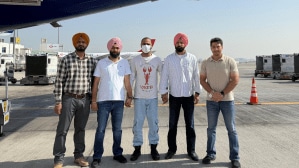Staring down the barrel of a gun
The ICC was staring down the barrel of a gun — which it loaded itself — today as it upped the ante over the contracts standoff, br...

The ICC was staring down the barrel of a gun — which it loaded itself — today as it upped the ante over the contracts standoff, bringing in the issue of patriotism by saying players had to decide between cash and country. World champions Australia seemed to have made their decision, as its leading players today said they would not sign the ‘‘illegal’’ contracts.
The ICC’s message came in a statement from chief executive Malcolm Speed: ‘‘If a player now finds that, through his own actions, he has put his commercial interests ahead of his ability to play for his country he needs to decide what is more important to him, the money or playing for his country.’’
|
Contract clauses were changed after we signed: Lele
|
||
|
Since the day the contract controversy surfaced, the present set of BCCI officials have put the blame on formner president AC Muthiah for agreeing to the ICC’s conditions. But Jaywant Lele, who was the secretary when the contract was first proposed, says they cannot be blamed for agreeing to ICC’s contentious clauses. Speaking to The Indian Express, Lele said: ‘‘When the agreement was signed (in 2000), the exclusivity was supposed to be only for a particular tournament. It was a normal thing but now all of a sudden they are saying, ‘It will also cover a month before and after the tournament’. Tell me which player or board will accept this?’’ Lele thinks the best is to select a ‘‘third-rate’’ team and send it to Sri Lanka. ‘‘What is the ICC without star players? Which crowd will go to the stadiums to see unknown faces?’’ |
||
He said it was a ‘‘well-established practice in elite sport’’ that, for the benefit of the game, protection against ambush marketing is given to the sport’s commercial partners.
He denied the charge that players’ rights had been infringed and said the ICC’s sponsorship and marketing agreements dated back two years, giving them ample warning.
‘‘This is nothing new…It is in place at the Olympics, the Commonwealth Games, the Rugby World Cup and the football world cup and it was a key element of the arrangements agreed with the players for the Cricket World Cup in 1999.’’ In India, advertisers who put their money on Indian cricketers are an unhappy lot. ‘‘We have only one player in the team endorsing our product. The story could be different the next time. But advertisers will be the real losers in this game and we will be examining the issue in detail’’, officials in Coke said.
On the other hand, Samsung officials say the contract it entered into with players still stands whatever the ICC diktat. ‘‘Legally, there’s nothing stopping us as our contract with players were entered into much before the ICC contracts. But we will abide by whatever the players decide’’, sources in Samsung said.
In Melbourne, Australian Cricketers’ Association (ACA) chief executive Tim May said though no Australian player was in direct conflict with a major sponsor, ‘‘they had taken this stance because, just because they don’t have one now, they may well have one in the future.’’
The contracts were illegal, he said, as they were inducing players to breach existing contracts. May told Reuters player associations around the cricketing world had advised their players they should not accept the playing agreements in their current form. ‘‘We’ve forwarded the advice (to the Australian players),’’ he said. ‘‘An offer has been made, an offer has been rejected, I would have thought the issue is now back with the ICC.’’







- 01
- 02
- 03
- 04
- 05
























